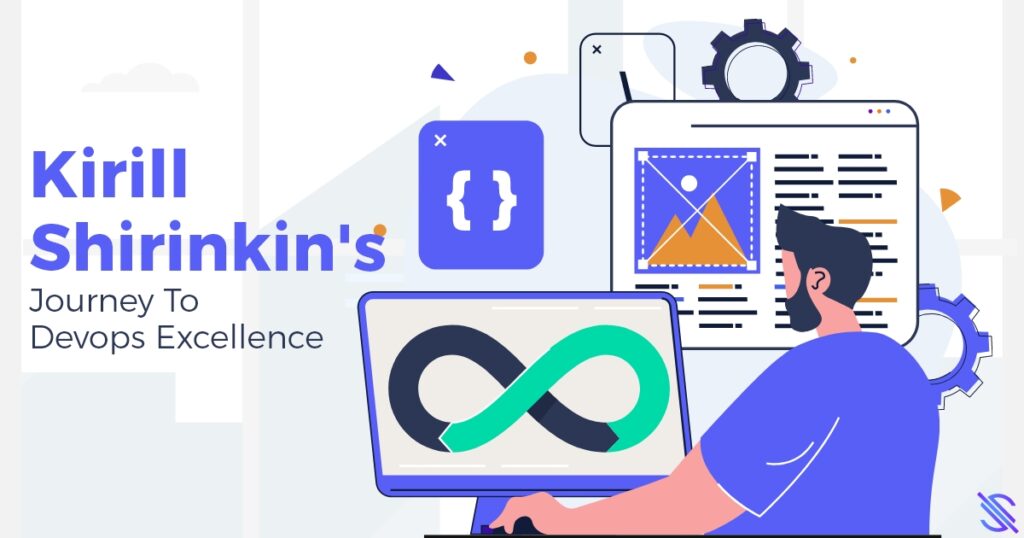
In the world of technology and programming, success stories often start with a spark of curiosity and a relentless pursuit of knowledge. Kirill Shirinkin, the co-founder of mkdev and an expert in AWS, Kubernetes, and DevOps, has a story that exemplifies the power of dedication and the pursuit of excellence. In this blog post, we’ll delve into Kirill’s inspirational journey from a casual computer user to a sought-after DevOps expert, and along the way, we’ll uncover valuable insights, advice, and unconventional wisdom that will inspire you to take action and excel in your own career.
The Unlikely Beginnings
Kirill’s journey into the world of programming didn’t begin with a grand vision or a burning passion for coding. Instead, it started with a computer at home that he used primarily for gaming. Like many youngsters, Kirill saw the computer as a means to an end, a gateway to virtual adventures. He had little interest in understanding how it worked or the world of programming that lay beneath the surface.
But sometimes, all it takes is a small nudge in the right direction. For Kirill, that nudge came when his father suggested he install Dreamweaver and try his hand at creating websites. This moment, however small, ignited a spark of curiosity within Kirill. He realized that coding, even in its simplest form, could lead to tangible results. Writing a few lines of HTML/CSS and seeing something appear on the screen was a revelation. It was the first step in a journey that would transform Kirill’s life.
The Mentorship that Changed Everything
Kirill’s path to becoming a programmer gained momentum when he found his first mentor, Evgeny Yanusov. Evgeny, the man behind the Game World Navigator website, became Kirill’s guide into the world of IT. Kirill’s role evolved into that of a content manager for the website, but more importantly, it opened the door to learning and exploration.
From tasks as simple as installing Jabber to following blogs on Google Reader, Kirill began to immerse himself in the IT world. He devoured articles about various programming languages and platforms, gradually expanding his knowledge base.
The Transition to Front-End Development
As Kirill’s interest in coding grew, he decided to explore front-end development. He started by creating basic websites using HTML and CSS. These early projects were crude, but they were the building blocks of his programming journey. With each project, his skills improved, and he soon found himself collaborating on websites related to gaming and music.
Kirill’s first paid project involved transforming an internet store’s layout from tables to blocks. It was a modest beginning, but it marked his entry into the world of web development. This project, which earned him 3000 roubles, was the first step towards a future filled with coding challenges and opportunities.
A Chance Encounter Leads to mkdev
One of the remarkable aspects of Kirill’s journey is the role played by serendipity. He crossed paths with Leonid Suschev, his future co-founder at mkdev, on the Game World Navigator message board. This unexpected meeting would become the basis for their partnership in the realm of IT education.
By 2010, Kirill had built an impressive portfolio and was working on various web development projects. His passion for programming was evident, and he was eager to take on new challenges. This drive led to a series of transitions, from front-end to back-end development, as he sought to deepen his expertise.
Learning by Doing
A key lesson from Kirill’s journey is the power of learning by doing. He embraced tasks that he had never encountered before, even if they seemed complicated and unfamiliar. This approach allowed him to expand his skill set rapidly. Whether it was adapting layouts for Internet Explorer 6 or diving into Ruby on Rails, Kirill’s willingness to tackle new challenges set him on a path of continuous growth.
Mentorship and Collaboration
Throughout his journey, Kirill also emphasized the importance of mentorship and collaboration. He learned from mentors, collaborated with fellow developers, and actively sought out opportunities to work on diverse projects. This collaborative spirit not only enriched his learning experience but also opened doors to new opportunities and connections.
A Controversial Piece of Advice
In the spirit of embracing unconventional wisdom, Kirill offers a piece of advice that challenges conventional thinking in the IT industry. He urges aspiring developers to disregard rigid rules and timetables. In a world where timelines for mastering skills are often predefined, Kirill believes that you can achieve proficiency in a shorter timeframe and start earning income sooner than you might expect. He encourages individuals to break free from the limitations imposed by common beliefs about wage ceilings and explore the vast potential for growth and success.
Continual Growth and Adaptation
Kirill’s commitment to continual growth and adaptation is a testament to his success. He takes on tasks that are complex and unfamiliar, pushing the boundaries of his knowledge and skills. This approach keeps his expertise relevant in a rapidly evolving field like IT.
Top 3 Books for Newbies
When asked about his top book recommendations for newcomers to programming, Kirill’s response may surprise you. He admits that he hadn’t read any programming books until 2015. Instead, he relied on documentation, articles, online resources, Google, mentors, and his own problem-solving abilities. However, he does recommend his own book, “Self-Education for Web-Developers,” as an accessible and beginner-friendly resource. Kirill’s commitment to making programming knowledge accessible to all shines through in this recommendation.
Top 3 Information Sources
In a world saturated with newsletters, websites, and information sources, Kirill offers a unique perspective. He suggests unsubscribing from most newsletters, unfollowing social media channels, and turning off notifications. Instead, he advocates for a more focused approach to skill development. Rather than passively consuming information, he encourages individuals to analyze their skills, identify weaknesses, and actively seek solutions. This approach allows for a more intentional and effective learning journey.
Conclusion:
Kirill Shirinkin’s journey from a casual computer user to a DevOps expert is a testament to the power of curiosity, mentorship, collaboration, and a relentless pursuit of knowledge. His story challenges conventional thinking in the IT industry and offers valuable insights for aspiring developers.
If there is one important lesson to learn from Kirill’s journey, it is that there are no set deadlines or salary ceilings for success in programming. It’s a journey of continuous learning and adaptation, where the willingness to tackle new challenges and the hunger for knowledge are your most valuable assets.
As you embark on your own career in programming or technology, remember Kirill’s story and the unconventional wisdom he shares. Whether you’re a newbie or a seasoned developer, there’s always room for growth, and the path to success may be filled with unexpected twists and turns. Embrace the journey, learn by doing, seek mentorship, and challenge the status quo. Your career in technology, like Kirill’s, has the potential to be a remarkable and inspiring story of growth and achievement.
